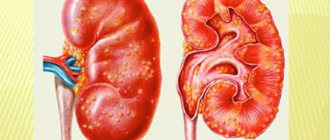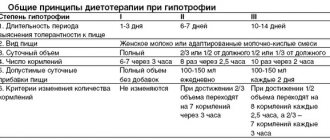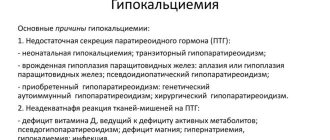- Types and causes of hypothyroidism
- Development mechanism
- Clinical manifestations
- Diagnosis of the disease
- Treatment of hypothyroidism
Hypothyroidism in children is a complex of diseases caused by a decrease in the production of hormones from this gland. The prefix hypo means decreased function, thyroid means thyroid gland. Hypothyroidism can be congenital or acquired. Clinical manifestations are determined by the age of the child. Successful treatment of this disease involves early diagnosis and regular use of medications that replace natural hormones.
What is congenital hypothyroidism in children
Congenital hypothyroidism (ICD code 10 - E03) is a congenital disease of the thyroid gland, which is characterized by the inability to produce thyroid hormones or their insufficient quantity. Congenital hypothyroidism is scary because it prevents the child’s body from growing and developing normally; various forms of mental and physical development delay occur.
According to statistics, this disease occurs in one baby out of 4-5 thousand. Most often, the pathology occurs in girls: 2-2.5 times more often than in newborn boys.
Treatment
Levothyroxine is used to treat hypothyroidism in children. This medicine is sold under the names L-thyroxine, Bagotirox, Eutirox. Depending on the type of disease, the drug is prescribed for several months or for life – this is called “hormone replacement therapy”. Artificial thyroxine works in the same way as natural hormone and allows normal growth and development even in the complete absence of the thyroid gland.
In addition to hormonal treatment, the doctor will prescribe vitamins and nootropic drugs that stimulate the development of nerve cells. Such drugs include Pantogam, Encephabol, Cortexin, Piracetam. Nootropics and multivitamins are taken 2-3 courses per year.
Children's clinics and rehabilitation centers offer massage and gymnastics courses. Therapeutic physical exercises help improve blood supply to the brain, reduce swelling, and enhance intestinal function, relieving constipation.
In addition to drug treatment, it is important to monitor the child’s nutrition. Maintain a diet rich in plant and animal protein - lean meat and fish, vegetables, dairy products. The iodine supply in the body is replenished by eating seafood, cheese, cottage cheese, apples, and tomatoes.
Diet restrictions apply to fatty foods (butter, cream, ice cream) and sweet baked goods. To prevent swelling, limit fluid intake to no more than the age norm.
On average, one-year-old children need 1.2 liters of water per day, 5 years old - 2 liters per day, 10 years old - no more than 2.5 liters.
Causes of congenital hypothyroidism
The causes of hypothyroidism in newborns can be varied. The disease itself develops due to abnormal development of the thyroid gland. Such an anomaly may be abnormal intrauterine development of the fetal organs: the thyroid gland may develop in the space behind the sternum or in the sublingual space, in addition, the tissues of the organ itself may be underdeveloped or completely absent.
The disease can also be caused by unfavorable factors affecting a woman during pregnancy:
- poor nutrition (lack of vitamins and minerals, important nutrients for the thyroid gland iodine and selenium);
- infectious diseases;
- autoimmune diseases;
- intoxication of the body;
- abuse of various medications;
- being in a radioactive irradiation zone.
According to statistics, hypothyroidism is a genetically determined pathology in only 2% of newborns.
Acquired hypothyroidism
A thyroid disease of this etiology begins to develop when the process of hormone formation in this organ of the endocrine system is disrupted. The causes of this pathology are:
- inflammatory diseases of internal organs;
- removal of the thyroid gland for medical reasons;
- iodine metabolism disorder.
Symptoms of acquired hypothyroidism:
- swelling of the face and upper extremities is noted, which appears regardless of the amount of fluid consumed;
- the child constantly feels the desire to sleep (excessive drowsiness);
- appetite decreases, in some cases the child refuses food altogether (even his favorite foods do not inspire him);
- the baby complains of fatigue even after a long rest;
- blood pressure is often low.
If these symptoms are present “one at a time,” then this is unlikely to indicate hypothyroidism.
But if parents note the presence of all the signs together, then this should be the reason for a visit to an endocrinologist. Often, hypothyroidism in a child develops against the background of disorders of the central nervous system, the progression of neoplasms (benign/malignant tumors) or existing congenital pathologies. We recommend reading: Diagnosis of thyroid hypothyroidism
Consequences of the disease
The consequences of insufficient thyroid hormone production can be catastrophic for a child without the necessary treatment.
Consequences of congenital hypothyroidism:
- delay in physical, emotional and intellectual development;
- since thyroid hormones affect the functioning of many organs, we can talk about emerging pathologies also from the heart, nervous system and psyche;
- in advanced cases, myxedema occurs (insufficiency of thyroid hormones in tissues and other organs), which leads to the patient’s coma.
Dear patients, in our medical center you can do an ultrasound of the thyroid gland.
Methods for detecting hypothyroidism
When diagnosing this disease, an integrated approach is used, which absolutely excludes any intervention in attempts to make a diagnosis with your own hands. An important role is played by collecting the mother's medical history, since it can be used to establish factors that could influence the onset of the disease.
In addition, the child is examined by a pediatrician and neonatologist, and blood tests for thyroid hormones, OAC and OAM are performed. Also, if necessary, CT and MRI, ultrasound of the thyroid gland and x-rays of the extremities are used. The price of blood tests in most public and private laboratories is not high, and this diagnostic method is one of the most indicative for congenital hypothyroidism.
From the photos and videos in this article, we learned for what reasons congenital decreased functioning of the thyroid gland occurs, what symptoms it manifests and how it is diagnosed.
Symptoms
There are a number of symptoms that may indicate pathology in a child even before birth or in the first hours of life:
- prematurity or post-term pregnancy;
- genetic predisposition;
- enlarged fontanel;
- birth of a large fetus (more than 4 kg).
Other symptoms begin to appear gradually:
- jaundice;
- with late passage of meconium in a newborn (first feces);
- frequent constipation and severe gas formation;
- hyporeflexia;
- incomplete fusion of cranial bones;
- Muscle weakness and apathy may occur.
By 3-6 months of life, a newborn with hypothyroidism may experience:
- dry skin;
- skin color may be jaundiced-gray;
- changes occur in the voice, it may be low with hoarseness;
- delays in mental and physical development.
In some cases, congenital hypothyroidism may not appear until the age of six.
Diagnostics
In the first weeks of life, it is very difficult to diagnose congenital hypothyroidism and this is possible only in 10-15% of cases, so doctors need to focus mainly on the existing symptoms, which were voiced in the article above. If symptoms exist in the first months and years of life, a number of studies are carried out that will be aimed at identifying the disease:
- routine examinations by a pediatrician, and before the child reaches the age of one month – by a neonatologist;
- taking a general and biochemical blood test to determine the concentration of thyroid hormones, cholesterol and other important indicators;
- monitoring the child’s pulse and blood pressure, since with hypothyroidism in children these indicators will be reduced;
- conducting an ECG, which may show bradycardia and other abnormalities;
- ultrasound examination of the thyroid gland, which can reveal both some deviations from the norm and the complete absence of the thyroid gland;
- in some cases, a CT or MRI of the baby’s head may be prescribed.
Symptoms and signs of hypothyroidism
There are some obligatory symptoms of hypothyroidism in children and, first of all, this is constant fatigue and fatigue. But such signs are quite difficult to determine, since the same fatigue can be a consequence of other reasons; it is for this reason that these symptoms are often simply not paid attention to. If there is some suspicion, you can independently try to determine the presence of the disease, which can be determined by both parents and medical specialists.
There are other signs indicating the presence of the disease
These include:
- the first external manifestations of goiter;
- depression;
- weight gain;
- slowness;
- dry and brittle hair;
- constipation;
- slow development;
- delayed puberty;
- labored breathing;
- slow heartbeat;
- speech problems.
Children who have congenital hypothyroidism differ from their peers in slower growth and development. The child's legs, arms and tongue are usually large, but sexual development is slow. At school, the teacher is able to see some signs, since the child experiences difficulties in the learning process, in speech development, in understanding objects, and also has problems in social behavior.
Treatment of congenital hypothyroidism
For treatment to be effective, it must begin immediately after diagnosis.
Usually, the child is immediately prescribed synthetic thyroid hormones - L thyroxine. The amount of this substance is selected individually, depending on the child’s weight and other parameters.
The effectiveness of drug therapy is assessed by the content of thyroid hormones in the child’s blood (TSH and T4), as well as the disappearance or presence of symptoms.
Sometimes, if necessary or to achieve greater effectiveness of treatment, additional vitamin complexes or drugs are prescribed to reduce the symptoms of hypothyroidism.
Diagnosis of the disease
It is based on studying the level of relevant hormones (the so-called thyroid panel) in the child’s blood. The study is carried out in numerous modern diagnostic centers or laboratories.
Particularly important is the diagnosis of congenital hypothyroidism. If the congenital process is diagnosed late—in a child older than 1 month—the changes in the nervous system will be irreversible and untreatable.
For the purpose of quick diagnosis, all children should undergo a special test: a few drops of the newborn’s blood are dripped onto filter paper.
Next, the content of thyroxine (T4) in this sample is examined.
A negative result completely confirms the absence of congenital hypothyroidism. If the result is positive or questionable, you should first contact your family doctor or local pediatrician, and then a pediatric endocrinologist.
Forecast
If the pathology is detected early, the consequences of congenital hypothyroidism will not be detrimental to the patient’s health, but are assessed by doctors as favorable.
With proper therapy, bringing the main thyroid hormones to normal levels, we can say that nothing will hinder the child’s development (taking into account the fact that hormone replacement therapy will be lifelong).
If congenital hypothyroidism is detected not in the first months of life, but at 3-6, then the chances of complete normalization of the condition are significantly reduced, even with proper treatment. At the same time, it is possible to achieve the required level of psychophysical development of the child, but there is a high probability of lagging behind in intellectual development.












